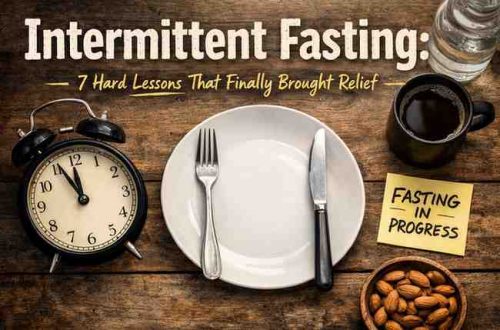
Honestly, I didn’t think intermittent fasting would work for me. I’d already burned through three “new starts” that year and felt kind of dumb for hoping again. My eating was all over the place—late-night snacks, stress lunches, “I deserve this” dinners. I wasn’t clueless about calories. I was exhausted by trying to care. So when a friend kept talking about intermittent fasting, I rolled my eyes. Another thing people swear by. Another thing I’d probably mess up.
I messed it up anyway. Just… differently.
What finally hooked me wasn’t a miracle before/after photo. It was the weird relief of not negotiating with myself all day. No grazing. No “maybe later.” Just a window to eat. The rest of the time? I didn’t have to decide. That quieted my brain more than I expected. Not gonna lie… the first week sucked. Headaches, hanger, that hollow feeling at 10:30 a.m. that made me question my life choices. Still, something shifted. Not instantly. Not cleanly. But enough that I kept going.
Below is the messy version of how intermittent fasting actually played out for me—what I misunderstood, what worked, what backfired, and who will probably hate this approach. From what I’ve seen, at least.
What I thought intermittent fasting was (and why that tripped me up)
I went in thinking intermittent fasting meant “don’t eat for long stretches, white-knuckle your way to results.” That mindset made me rigid. I picked 16:8 because everyone online seemed to. Sixteen hours fasting. Eight hours eating. Easy math. Hard reality.
Here’s what I misunderstood:
-
I treated fasting hours like punishment.
I’d stare at the clock. “Only 47 minutes to go.” That turned the whole thing into a countdown to food. Miserable. -
I thought hunger meant I was failing.
Hunger is information, not a moral verdict. Some hunger is normal at first. Panic hunger? That was my cue I’d gone too hard. -
I assumed results would show up fast.
I expected visible changes in two weeks. When they didn’t, I nearly quit. This honestly surprised me—how slow the early phase felt even when something good was happening under the hood.
What helped was reframing intermittent fasting as structure, not suffering. The structure gave me boundaries. The suffering was optional—and often self-inflicted.
The version that finally worked for me (routine, not rules)
I stopped chasing the “perfect” schedule and built one around my actual life. U.S.-style workday, morning coffee, occasional social dinners.
My boring, repeatable routine:
-
Weekdays:
-
Black coffee or plain tea in the morning
-
First meal around 12:30–1:00 p.m.
-
Last meal by 8:30 p.m.
-
That’s roughly 15–16 hours of fasting most days
-
-
Weekends:
-
Looser window. Sometimes 14 hours.
-
If there’s brunch, I eat brunch. I don’t punish myself for it.
-
-
Hydration:
-
Water with a pinch of salt if I felt foggy
-
Sparkling water when my mouth just wanted something
-
-
Training days:
-
If I lifted heavy early, I ate earlier. Period.
-
I stopped pretending discipline beats physiology.
-
This is where intermittent fasting became livable. Not optimized. Livable.
The small wins that kept me going:
-
Mornings felt lighter. Less food coma hangover.
-
Fewer random snacks. My kitchen stopped calling my name.
-
My energy smoothed out after week two.
I didn’t expect that at all.
What still annoyed me:
-
Social stuff. Late dinners push the window late.
-
Travel days. Airports don’t care about your fasting plan.
-
The occasional spiral when I “broke” the fast with a cookie and then… three more cookies.
Still. Progress over purity.
The stuff nobody warned me about (but should have)
Intermittent fasting is sold like a clean lifestyle upgrade. The lived version is messier.
1) The first 10 days can feel fake-hard
Not “I’m dying” hard. More like your body throwing a small tantrum because it lost its usual snack schedule.
-
Headaches
-
Irritability
-
That hollow, buzzy feeling in your stomach
-
Random fatigue at weird times
This fades. Not always by day 3 like TikTok promises. More like day 7–10 for me.
2) Hunger comes in waves
This changed everything for me. Hunger isn’t a steady climb. It spikes. Then it passes.
If I drank water, took a short walk, or just stayed busy for 15 minutes, the wave usually broke. I didn’t starve. My brain just panicked.
3) Your first meal matters more than you think
When I broke my fast with sugary junk, I crashed hard later. When I led with protein + fiber, the day felt steadier.
Not perfect. Just… steadier.
Examples that didn’t wreck my afternoon:
-
Greek yogurt + berries + nuts
-
Eggs + sautéed veggies
-
Chicken salad + olive oil
-
Leftover rice + beans + greens
Examples that did:
-
Pastry + coffee
-
Cereal “just to start”
-
Energy drink and vibes
4) Stress can blow the whole thing up
On high-stress days, fasting felt 3x harder. Cortisol + no food = me snapping at people. That was a signal to be gentler, not tougher.
How long did it take to see anything real?
This is the question everyone wants answered.
Short answer:
Some benefits showed up in 2–3 weeks. Visible body changes took 6–10 weeks. Deeper habit changes took months.
What I noticed, in order:
-
Week 1–2:
Less bloating. Fewer food decisions. Mild misery. -
Week 3–4:
Energy steadier. Morning brain fog lighter.
Scale? Meh. Didn’t move much. -
Week 6–10:
Clothes fit differently.
I stopped thinking about snacks constantly. -
Month 3+:
My default eating rhythm changed.
This was the real win. The habit stuck.
If you’re chasing fast cosmetic results, intermittent fasting can feel slow. If you’re chasing control over your eating rhythm, it’s weirdly effective.
Common mistakes I made (don’t repeat these)
I’m listing these because I personally tripped over every single one.
-
Going too extreme, too fast
Jumping into 20:4 because “hardcore gets results” just made me quit faster. -
Not eating enough protein
I’d break my fast with carbs and wonder why I was starving two hours later. Protein fixed a lot of that. -
Treating fasting hours like a license to binge later
Eating window ≠ food free-for-all.
This slowed results and messed with my digestion. -
Ignoring sleep
Poor sleep made fasting feel impossible. This isn’t motivational fluff. It’s mechanical. -
Comparing my progress to internet timelines
My body didn’t read the same blog posts.
The “is intermittent fasting worth it?” part (no hype version)
Is intermittent fasting worth it?
For me? Yes.
Not because it melted weight off.
Because it simplified my relationship with food.
Here’s the honest tradeoff:
What you might gain:
-
Fewer food decisions
-
A clear eating rhythm
-
Less late-night grazing
-
A gentle reset for portion awareness
-
Possible metabolic and insulin sensitivity benefits over time
What you’ll probably pay:
-
An uncomfortable adjustment phase
-
Social awkwardness sometimes
-
Occasional hunger waves
-
The need to plan meals better
-
The realization that fasting doesn’t fix emotional eating by itself
Intermittent fasting didn’t solve everything. It just removed friction. That was enough to change my behavior.
Objections I had (and how they played out)
“Won’t this mess up my metabolism?”
From what I’ve seen, short daily fasts aren’t metabolic sabotage for most people. The bigger risk is chronic undereating. I had to make sure I ate enough during my window.
“Isn’t breakfast the most important meal?”
It is—for some people. For me, forcing breakfast made me snack all day. Skipping breakfast made my day calmer. This is personal, not moral.
“This sounds like disordered eating.”
It can become that if you’re using fasting to punish yourself. That’s a real risk. I had to check my mindset. Structure felt good. Control felt bad. There’s a difference.
“I’ll lose muscle.”
I worried about this. Lifting weights and eating enough protein during my eating window helped me maintain muscle. I didn’t shrink into dust.
Who should avoid intermittent fasting (or be extra cautious)
This is the part that doesn’t get said loud enough.
Intermittent fasting is not for everyone. I wouldn’t recommend it if:
-
You’ve had an eating disorder or feel your thoughts getting obsessive
-
You’re pregnant or breastfeeding
-
You have a medical condition that requires regular food intake
-
You’re on meds that need food
-
You’re already under-eating
-
You’re training intensely and can’t recover without morning fuel
-
You notice fasting triggers anxiety spirals or binge cycles
If fasting makes you feel smaller in a bad way—emotionally, mentally—walk away. There are other paths.
Reality check: what intermittent fasting won’t do for you
This is where a lot of disappointment lives.
-
It won’t fix a chaotic diet by itself.
If your eating window is mostly ultra-processed food, fasting hours won’t cancel that out. -
It won’t erase stress eating.
I still had to face why I reached for food when overwhelmed. -
It won’t make social eating easy.
You’ll sometimes choose between your window and your people. That’s real. -
It won’t feel “effortless” every day.
Some days you’ll want to eat earlier. Sometimes you should.
Intermittent fasting is a tool. Not a personality.
A short FAQ (the stuff people actually ask)
Does intermittent fasting work for weight loss?
It can, mostly because it simplifies eating patterns and can reduce mindless snacking. It’s not magic. Calories still matter in the real world.
Can I drink coffee while fasting?
Plain coffee and tea were fine for me. Sweeteners or cream broke my fast mentally and made hunger worse later.
What breaks a fast?
Calories, technically. But I learned to care more about what broke my rhythm. A splash of milk ruined my mental groove more than it ruined any metabolic benefit.
Do I have to do 16:8?
No. I started there, but 14:10 worked better some weeks. Consistency > perfection.
Is intermittent fasting safe long-term?
For many people, yes. For some, no. This depends on your health, your history, and your relationship with food.
How I adjusted when progress stalled
Plateaus happen. Mine lasted about three weeks. Here’s what helped without turning my life into a science experiment:
-
I added more protein to my first meal
-
I walked more after meals (10–15 minutes)
-
I stopped “saving calories” for junk at night
-
I slept more (boring, but true)
-
I relaxed my window on weekends instead of rebelling on weekdays
That combo restarted things gently. No extremes.
Practical takeaways (the stuff I wish someone had told me)
What to do:
-
Start with a 12–14 hour fast if you’re nervous
-
Build your window around your life, not Instagram
-
Drink water. Then drink more water
-
Lead your first meal with protein
-
Expect 1–2 uncomfortable weeks
What to avoid:
-
Extreme fasting out of the gate
-
Binging in the eating window
-
Treating hunger like an emergency
-
Using fasting as punishment
-
Comparing timelines
What to expect emotionally:
-
Early doubt
-
Midway frustration
-
Small “oh wow” moments
-
Occasional backslides
-
Quiet confidence if you stick with it
What patience looks like:
-
Two weeks before it feels normal
-
Two months before changes show
-
A few months before habits stick
-
Ongoing flexibility so you don’t burn out
No guarantees. No hacks. Just a rhythm you can live with.
I won’t pretend intermittent fasting changed my life overnight. It didn’t. I still eat dessert. I still have days where my window collapses because I’m human. But it gave me a calmer default. Fewer food decisions. Less constant noise in my head.
So no—this isn’t magic.
But for me? It stopped feeling impossible.
And that was enough to keep going.



